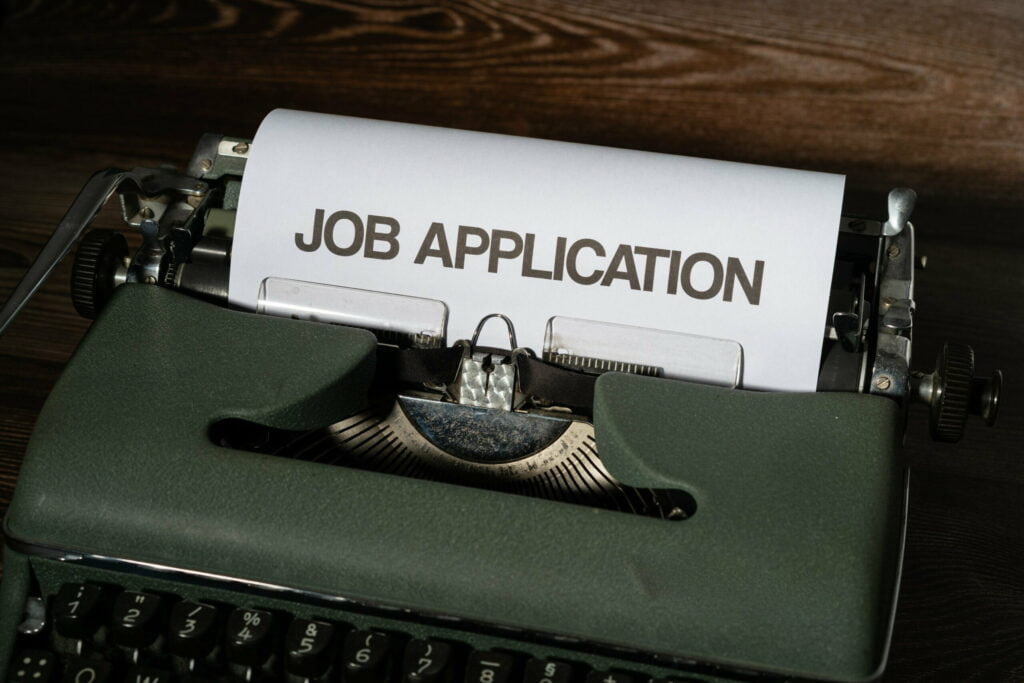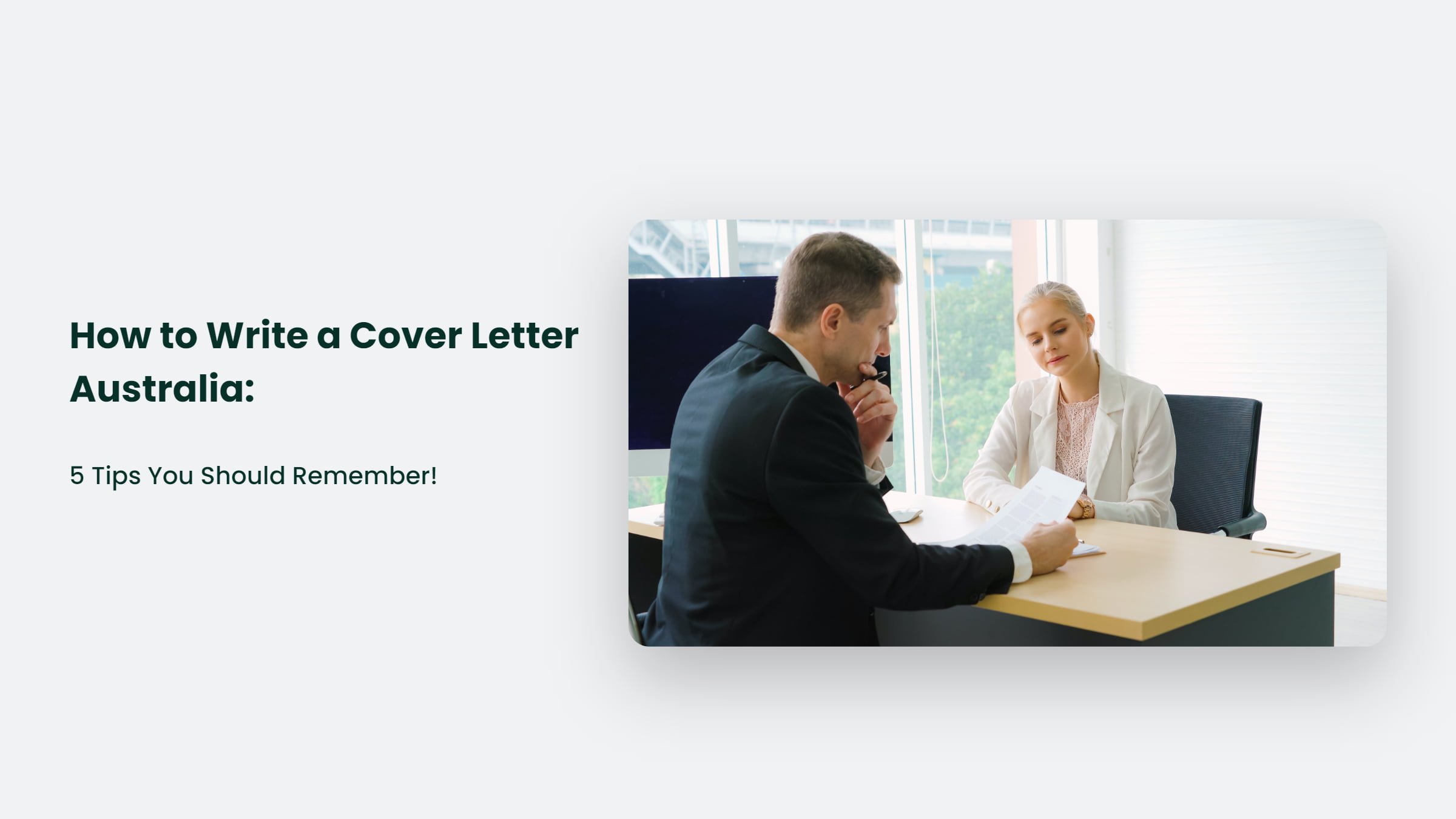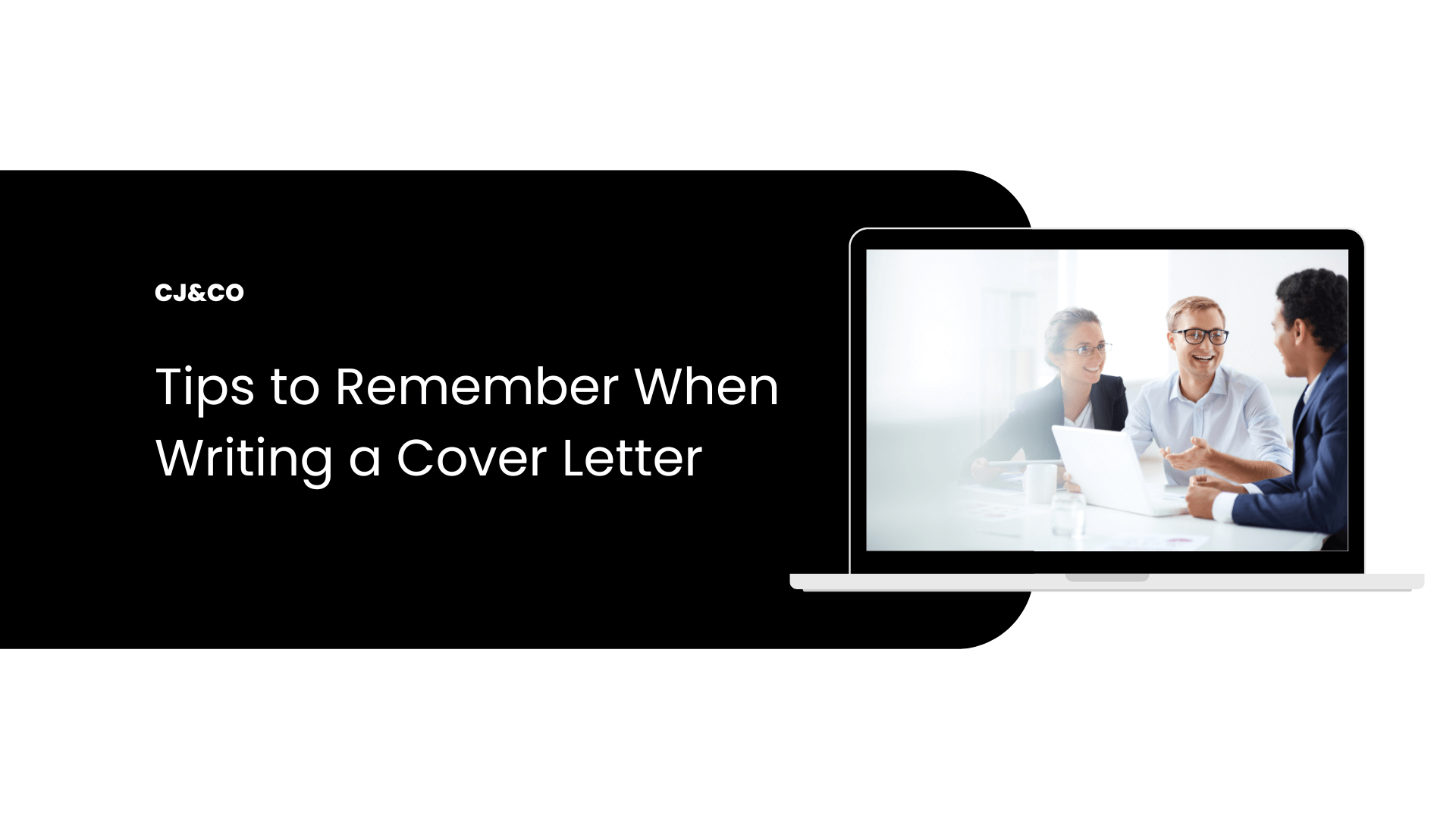

How to Write a Cover Letter Australia: 5 Tips You Should Know!

As Seen On
It’s no secret that job applications in Australia are becoming increasingly online and digital. With most large organisations asking for a resume, cover letter and/or application form to be submitted via an e-application portal, the days of mailing out a paper copy of your application are slowly ending.
Much like your resume, your cover letter is an essential part of your application that can help you stand out from the crowd.
However, many people find writing a cover letter difficult – especially if they don’t know where to start.
To make things easier for you, we’ve put together a step-by-step guide on how to write a cover letter in Australia, for your job application. Keep reading to learn more!

Table of Contents
What is a cover letter?
Ah yes, the mysterious cover letter! It’s like the secret ingredient to successfully get any job: everyone knows it should be somewhere, but no one can quite nail down what it should actually consist of.
If you’ve ever been asked to include a cover letter when submitting a job application and have no idea what that means, then don’t worry – you’re not alone!
A cover letter is just your way of introducing yourself and giving an employer an overview of your experience and qualifications.
Think of it as a friendly handshake when walking into a job interview; At the same time, it might seem superfluous or unnecessary at first, but it’s still important because it helps open the door to a great connection between you and the company you’re hoping to impress.
In sum, if you want your job application to make the best impression possible, remember to include that all-important cover letter! It may surprise you with how much difference it can make!
Why are cover letters important?
Cover letters are an essential part of the job application process – and, unfortunately, often overlooked or misunderstood.
To be seen as a serious candidate for a role, it is vital to include a compelling cover letter in any application. It is essentially the chance to introduce yourself, make a strong case for why you’re the best person for the job, and show your personality so that employers can better understand who you are!
Written effectively, it offers applicants the opportunity to stand out from their competition and demonstrate enthusiasm and motivation.
So don’t underestimate its importance — failing to write one might mean you’re giving up before you’ve even started!
With such great potential benefits to convey your story and interests in written form, why not take advantage of covering the basics and writing an awesome cover letter?
You never know — it could be just what makes the difference in getting your dream job!
Step-by-Step Guide to Write a Cover Letter For Australia Job:
Start with a personal salutation:
Begin your cover letter by addressing the hiring manager directly, using their full name if possible.
It helps to show that you have taken the time and effort to research who they are and make a personal connection which will go over well in an interview.
Introduce yourself:
Writing a compelling cover letter for a job in Australia is essential. The first step to getting your dream role is introducing yourself in an impressive way. Start by addressing the employer by name, show appreciation for the opportunity, and highlight your relevant qualifications and skills.
Ensure any claims you make are backed up with concrete examples, such as accomplishments at previous positions or related coursework. Finish your introduction with a statement of enthusiasm for joining their team and demonstrate your knowledge of the company culture.
Expand on why you’re a good fit for this particular role:
It’s important to focus on why you’re a good fit for the role, as this will be vital to making a strong impression. Highlight the specific skills and experience that make you an ideal candidate while explaining your enthusiasm for the position. Make sure you address any questions the employer asks in the job listing.
Finally, set yourself apart from other applicants with something more personal such as how your educational background or family history has shaped who you are today and why that makes you well-suited for this particular role. With these tips in mind, your cover letter will make a memorable difference!
Show that you have taken the time to research the company:
Writing a cover letter for an Australian job takes time, effort and research. Researching the company, you’re applying to demonstrates that you are genuinely interested in the role and have prior knowledge about the organisation.
Utilize different sources such as their website, press articles, and even word-of-mouth connections to build an understanding of the company culture and its specific needs. Knowing these details will help you tailor your cover letter more effectively, ensuring that you stand out from other applicants.
Taking this extra step will show potential employers that you are motivated to succeed and passionate about joining their team.
Provide examples of relevant experience:
Use specific examples to illustrate how you have used your expertise and knowledge in similar roles or projects, giving evidence of your suitability for the position.
End on a positive note:
Finally, wrap up by wishing the employer luck in their search and offer to provide any further information that might be required during the process, such as references.
Tips to Remember When Writing a Cover Letter:

Numbers, Numbers and More Numbers:
When writing a cover letter, you could say there is a straightforward answer: make sure you include numbers.
After all, what employer doesn’t appreciate solid numerical evidence?
Mentioning how many years of experience you have or how much money you’ve saved on past projects can demonstrate just how much value you can bring to their organisation.
Better yet, framing results with comparative terms such as “15% more” or “50% fewer” errors is even more compelling!
Of course, too much of a good thing is never wise – nobody wants a cover letter full of boring statistics.
Still, metrics can be used in a fun and creative way that captures an employer’s attention and highlights your qualifications in a unique light.
A little math today goes a long way towards securing the job of your dreams tomorrow.
No need to recite your multiplication tables – make sure you don’t forget these important numbers!
Don’t be task-oriented, be result oriented:
When writing a cover letter, beware of falling into the trap of task-oriented writing.
No one wants to read a laundry list of accomplishments or tedious descriptions of day-to-day tasks. Instead, focus on presenting the results achieved.
After all, the bottom line is that you made a difference, and that’s what employers want to know.
Show them how you met challenges with skill and expertise, exceeded expectations, and brought success wherever you went.
When writing this section of your cover letter, aim for a lighthearted tone that gets your point across in an entertaining way – after all, hiring personnel have probably read hundreds (if not thousands) of stuffy resumes already!
Remember that while humour is important, it should still be professional – no one wants to hire someone who can’t take their job seriously.
You can stand out from the crowd with some wit and charm without sacrificing professionalism.
So don’t be task-oriented; be result-oriented for better cover letter success!
Mimic the words they use in the Job Advertisements:
When writing a cover letter, it’s important to demonstrate your fit for the job.
One of the best ways to do this is to use language that shows you’ve seen the job advertisement closely and are confident that you possess the qualifications they’re seeking.
The best way to make sure that you’ve hit all their requirements? Mimic their words!
Match the tone and phrasing of the job advertisement as much as possible – if they give detailed instructions on applying, it’s best to follow them word for word.
If they talk about their sense of energy in their mission statement? Work that word into your resume.
A little humour can go a long way, too — if something was presented with wit or playfulness in the job ad, don’t be afraid to show your wit and personality in your letter.
Follow these pointers, and you’ll have an application package that ups any employer’s wow factor!
After all, making sure your cover letter looks like a pro crafted requires some professional-level cover letter techniques – which one is using their own words back at them?
Remember: when working on perfecting a cover letter, don’t be bashful — be bold, Boldy McBoldface and watch those good vibes (and potential hire offers) come rolling in!
Use Bullet Points:
Cover letters are one of the trickiest pieces of job applications. With just a few paragraphs, you’re expected to explain why you’re the perfect person for the job eloquently and succinctly.
Thankfully, bullet points are one way to ensure your cover letter is as effective as possible.
Yep, never underestimate the power of a few well-crafted sentences arranged in point form – they can turn a meandering missive into a snapshot of your career and qualifications.
And if that isn’t enough to convince you that bullet points are necessary for successful cover letters, consider this: bullets also create visual interest by providing an attractive break from long blocks of text – something any employer will appreciate!
So don’t stress about making sure every word is perfect – grab your trusty pen and start jotting down some bullets instead.
Before you know it, you’ll have created an impressive cover letter that impresses employers with its clarity and precision! Good luck!
Highlight Key Skills:
An important tip to remember when crafting a cover letter is to highlight your key skills and experiences relating to the job you’re applying for. Whether they are hard or soft skills, recruiters must understand your qualifications in relation to the position at hand.
Highlighting these key skills in the cover letter helps you stand out from other applicants and shows that you took the time to ensure your skills and background matched what was outlined in the job description. Put yourself ahead of the pack by being thoughtful and thorough in your cover letter writing.
Mistakes to Avoid:
Don’t use a generic cover letter:
One of the biggest mistakes you can make when writing a cover letter is to use a generic, one-size-fits-all letter. This type of letter doesn’t provide any specific information about your qualifications or why you’re interested in the position, and it can quickly eliminate you from the pool of candidates.
Instead, take the time to write a unique cover letter for each position you apply for.
Don’t regurgitate your resume:
Your cover letter should not simply list your accomplishments and job experience; it should be an opportunity to sell yourself as the best candidate for the position.
Avoid repeating information from your resume verbatim; use your cover letter to highlight specific skills and experiences that make you well-suited for the job.
Don’t forget to proofread:
Before sending off your cover letter, proofread it carefully for any typos or grammatical errors. These types of errors can create a negative impression of you as a candidate, so it’s important to take the time to ensure your letter is error-free.
Ask someone else to read over your cover letter to catch any errors you may have missed.
Frequently Asked Questions
What should I include in my cover letter?
Your cover letter should include your contact information, a few compelling sentences about why you’re the perfect candidate for the job, and several bulleted points that showcase your qualifications and experience
How long should a cover letter be?
Generally speaking, a cover letter should be no longer than one page – somewhere between three to five paragraphs is usually enough.
How do I make sure my cover letters stand out from the crowd?
Make sure you use language that mimics the words used in the job advertisement and some humour where appropriate! Also, try using bullet points to ensure your qualifications and experience are easily read.
The Bottom Line:
By following the tips above, you can write a cover letter that will stand out and give you the best possible chance of getting the job you want in Australia. Good luck!
Konger
Up until working with Casey, we had only had poor to mediocre experiences outsourcing work to agencies. Casey & the team at CJ&CO are the exception to the rule.
Communication was beyond great, his understanding of our vision was phenomenal, and instead of needing babysitting like the other agencies we worked with, he was not only completely dependable but also gave us sound suggestions on how to get better results, at the risk of us not needing him for the initial job we requested (absolute gem).
This has truly been the first time we worked with someone outside of our business that quickly grasped our vision, and that I could completely forget about and would still deliver above expectations.
I honestly can't wait to work in many more projects together!
Disclaimer
*The information this blog provides is for general informational purposes only and is not intended as financial or professional advice. The information may not reflect current developments and may be changed or updated without notice. Any opinions expressed on this blog are the author’s own and do not necessarily reflect the views of the author’s employer or any other organization. You should not act or rely on any information contained in this blog without first seeking the advice of a professional. No representation or warranty, express or implied, is made as to the accuracy or completeness of the information contained in this blog. The author and affiliated parties assume no liability for any errors or omissions.

